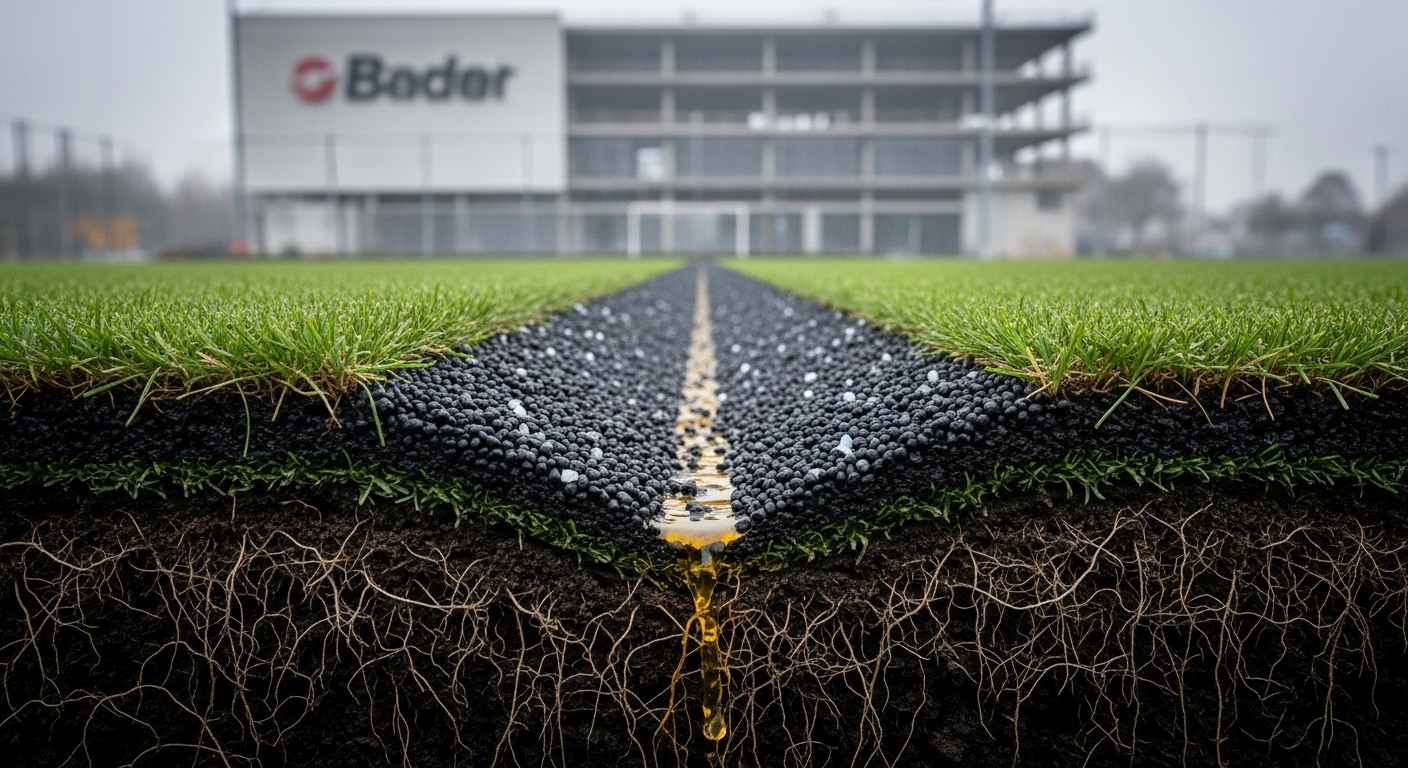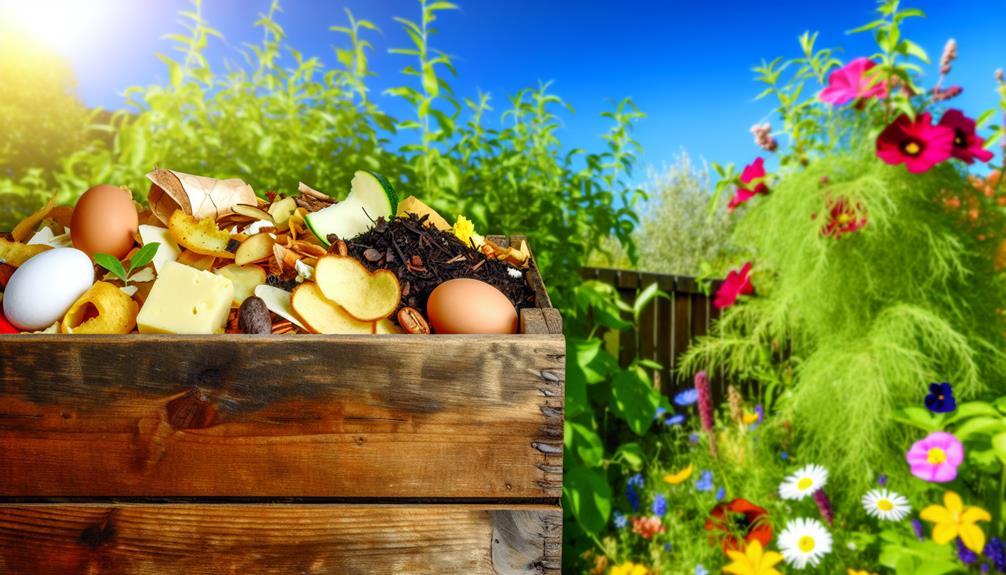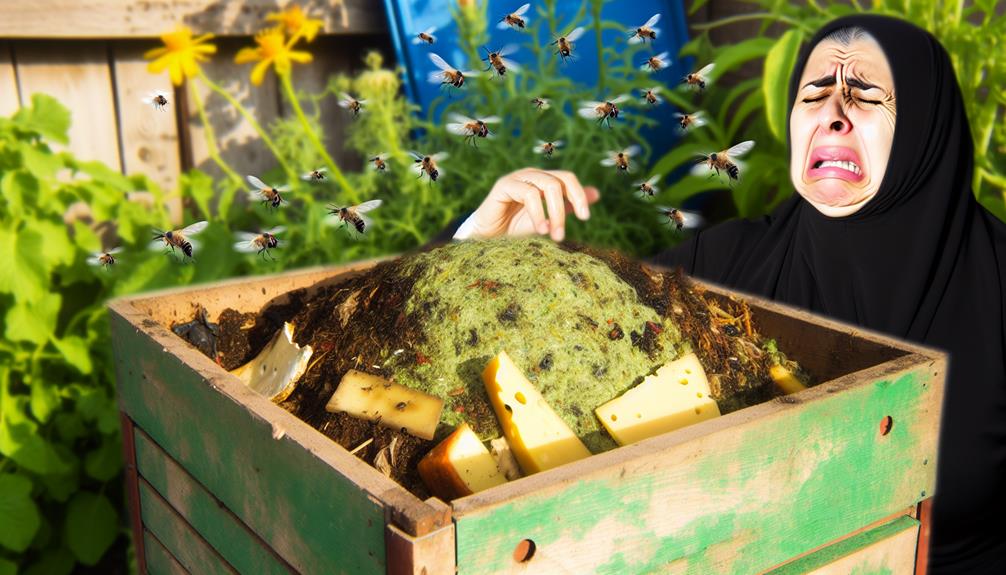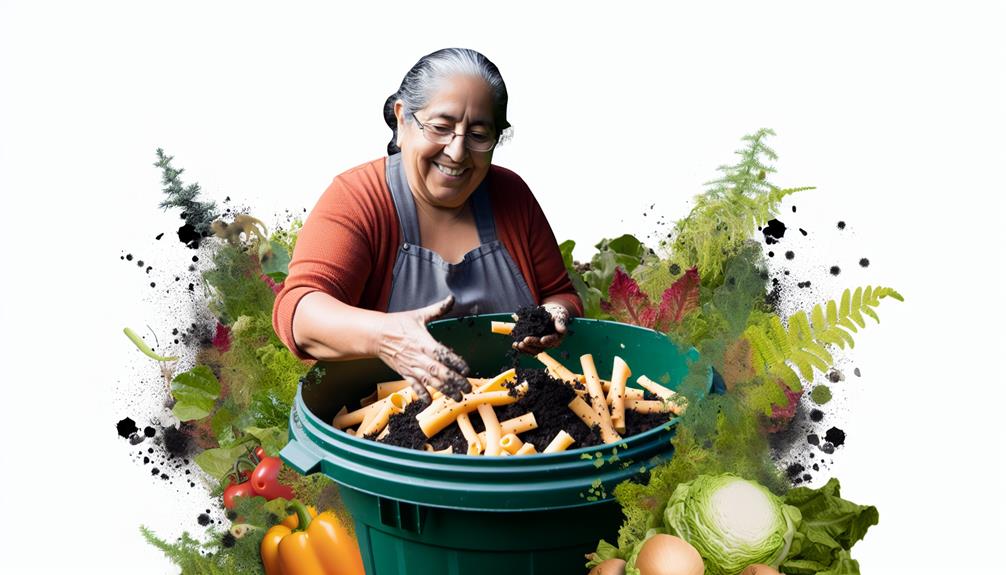

You can compost cheese, but it requires extra care to manage odors and pests. Cheese is rich in nutrients like nitrogen and phosphorus, enriching your compost and reducing food waste. However, it can attract rodents and flies and disrupt compost balance due to its high fat and protein content.
To compost cheese effectively, use a well-maintained bin, chop cheese into small pieces, and balance it with carbon-rich materials. Regularly turn the compost and monitor moisture levels to control smells and deter pests. Different cheese varieties break down at different rates, so proper management is key. Interested in mastering composting techniques?
When you compost cheese, you add nutrient-rich organic matter to your compost pile, benefiting your garden soil.
Cheese also breaks down faster than many other food scraps, speeding up the overall decomposition process.
This means you’ll get usable compost more quickly, enhancing your gardening efforts.
By adding cheese to your compost, you’re enriching it with valuable nutrients like nitrogen and phosphorus. These nutrients play a critical role in plant growth, making your compost a powerhouse of fertility. The nutrient content in cheese contributes greatly to the organic benefits of composting, turning your garden waste into a robust, nutrient-rich organic matter.
When you include cheese in your compost pile, you’re providing a diverse array of essential elements. Cheese is rich in protein, which breaks down into nitrogen—a key component for healthy plant leaves and overall growth. Additionally, the phosphorus found in cheese aids in root development and flowering, ensuring your plants thrive.
To maximize these benefits, make sure you balance your compost by adding other organic materials like fruit peels, coffee grounds, and yard clippings. This mix helps maintain the right carbon-to-nitrogen ratio, crucial for effective composting.
Remember to chop the cheese into small pieces before adding it to your pile, as this speeds up the decomposition process.
Thanks to its high moisture content and soft texture, cheese breaks down quickly in a compost pile, accelerating the decomposition process. When you add cheese to your compost, you’re essentially providing a boost to microbial activity. These microbes thrive on the nutrients in cheese, working more efficiently to break down organic matter.
This results in your compost pile heating up faster, which is important for effective composting. Temperature control is important in this process. Higher temperatures not only speed up decomposition but also help in killing off harmful pathogens. To maintain ideal temperature, make sure your compost pile has a balanced mix of green and brown materials.
Cheese counts as a green material, rich in nitrogen, which can help balance out carbon-heavy brown materials like leaves and paper.
Also Read: Can You Compost Celery?
One major downside of composting cheese is that it can attract pests like rodents and flies. Rodent attraction is a serious concern because it can lead to infestations that are difficult to control. Even a small amount of cheese in your compost pile can draw in mice and rats, which not only disrupt the composting process but also pose health risks.

In addition to attracting pests, cheese can contribute to significant odor production. When cheese breaks down, it releases strong, unpleasant smells that can be a nuisance, especially if your compost bin is located near your home or garden. These odors can make your composting experience less enjoyable and may even deter you from continuing the practice.
To minimize these issues, it’s essential to manage your compost pile carefully. You can counteract the odors by adding more brown materials like leaves and paper to balance the mix. Regularly turning the compost helps aerate the pile, which can reduce odor and deter pests.
If you still find pests to be a persistent problem, consider using a closed compost bin designed to keep them out. By following these guidelines, you can mitigate some of the cons of composting cheese.
When adding cheese to your compost, you might encounter several potential issues that could complicate the composting process. Cheese, being a dairy product, can create a variety of challenges that you should be aware of before incorporating it into your compost pile.
Firstly, cheese can lead to significant odor issues. As it decomposes, it releases strong smells that mightn’t only be unpleasant but could also disturb your neighbors.
Additionally, cheese is known for attracting pests. Rodents, raccoons, and other animals may be drawn to your compost pile, making it a hotspot for unwanted visitors.
Moreover, cheese can disrupt the balance of your compost. Its high fat and protein content can slow down the decomposition process, making it harder to achieve the rich, dark compost you’re aiming for.
To add, the presence of cheese can introduce harmful bacteria to your compost. These bacteria can thrive in the moist environment of decomposing dairy, potentially spreading to other parts of your garden.
To summarize, when adding cheese to your compost, be aware of these potential issues:
Being mindful of these factors can help you manage your compost more effectively.
Also Read: Can You Compost Bag?
To effectively incorporate cheese into your compost, follow these best practices to mitigate potential issues. First, always use a well-maintained compost bin to control odors and deter pests. Choose the right cheese types; hard cheeses like cheddar break down more slowly, while soft cheeses like brie can attract unwanted critters faster.
It’s essential to balance the nitrogen-rich cheese with carbon-rich materials like leaves or shredded paper. Chop the cheese into small pieces to speed up decomposition and mix it well with other compost materials. Avoid adding large quantities at once, as this can upset the balance of your compost.
Here’s a quick reference table to guide you:
| Cheese Type | Composting Tip |
|---|---|
| Hard Cheese | Chop finely, mix well with carbon sources |
| Soft Cheese | Use sparingly, balance with dry materials |
| Moldy Cheese | Safe to compost, handle like soft cheese |
| Processed | Avoid in large amounts, high in preservatives |
| Aged Cheese | Break down slowly, monitor for pests |
Keep your compost bin aerated by turning it regularly, ensuring that the cheese doesn’t create clumps. Finally, maintain a balanced moisture level; too much moisture can lead to unpleasant smells. By adhering to these best practices, you’ll integrate cheese into your compost successfully, fostering a greener, more sustainable environment for your community.
Also Read: Can You Compost Blood?
If traditional composting isn’t feasible, consider vermicomposting as an effective alternative for breaking down cheese waste. Vermicomposting utilizes worms to decompose organic material, including cheese, in a controlled environment. You’ll need to set up vermiculture bins, which are specialized containers designed to house the worms and the composting material.
Here’s how you can get started:
Vermiculture bins offer a sense of community as you nurture your worms and watch them turn waste into valuable compost. This method not only helps reduce food waste but also creates a richer, more nutrient-dense compost for your garden.
Experts frequently emphasize the importance of maintaining the right balance of green and brown materials in your compost to optimize the breakdown of cheese. Green materials, such as fruit and vegetable scraps, provide nitrogen, while brown materials, like leaves and straw, offer carbon. Achieving this balance helps prevent common composting myths, such as the idea that cheese will always cause bad odors or attract pests.

When composting cheese, it’s vital to break it into smaller pieces. This increases the surface area, allowing microbes to work more efficiently. Different cheese varieties, whether hard or soft, can be composted, but softer cheeses may break down faster.
Remember to mix cheese well into the compost pile to make sure it’s not exposed on the surface. Covering it with a layer of brown materials will help mitigate odors and deter pests. Turning your compost regularly aerates the pile and speeds up decomposition.
The decomposition rate of cheese in compost depends on compost temperature. In a hot compost pile (130°F-160°F), cheese can decompose within a few weeks. In cooler compost, it could take months. Keep your pile warm for faster results.
You’re wondering if moldy cheese can be added to compost. It can, but you should use caution. To promote compost safety, make sure it’s in small amounts and well-mixed. This way, you’ll maintain a healthy compost community.
Yes, composting cheese can attract pests, but don’t worry! You can use pest control methods like compost barriers to keep critters out. Join our community and share tips for a thriving, pest-free compost!
When choosing cheese for composting, opt for aged cheese in small amounts to minimize pests. Soft cheese can also be composted, but in moderation. Join fellow composters who balance their piles for best results.
When deciding if you should shred cheese before composting, consider its consistency. Shredding tools can help break it down faster, making it easier for your compost community to manage. You’ll feel more connected with fellow composters.
Incorporating cheese into your compost can be done, but it requires careful management. Follow best practices to mitigate issues like odor and pests.
Always balance with plenty of browns, and consider alternatives like bokashi composting if problems persist.
By understanding the pros and cons and using expert tips, you’ll optimize your composting process.
Remember, with proper care, even tricky items like cheese can contribute to rich, fertile compost for your garden.
